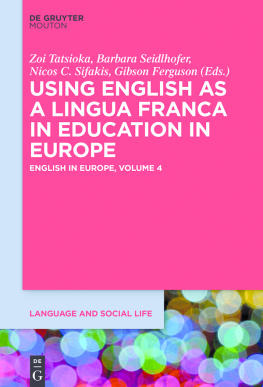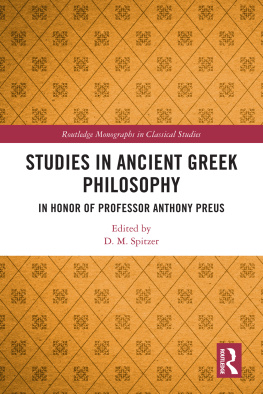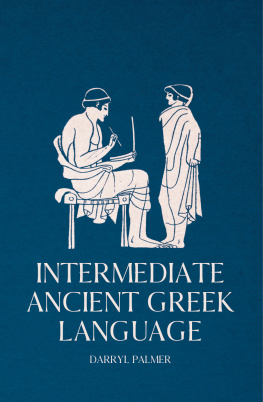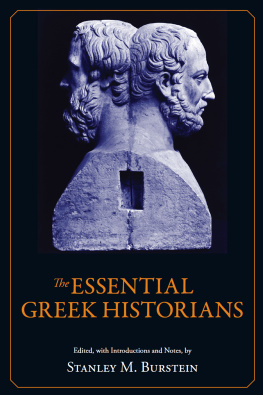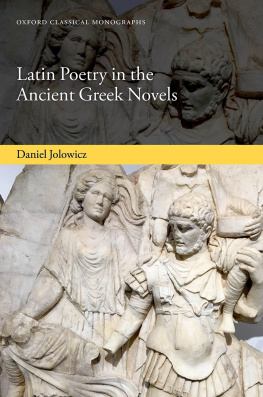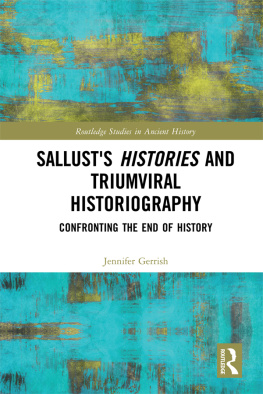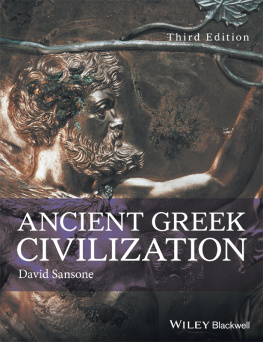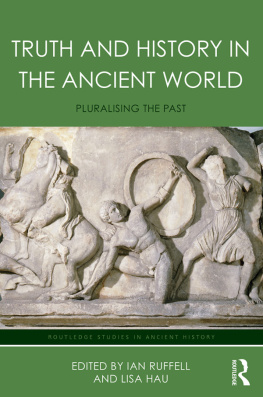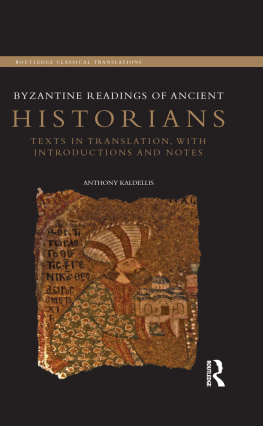Contents
Guide

Ivan Matijai
Shaping the Canons of Ancient Greek Historiography
Beitrge zur Altertumskunde

Herausgegeben von Susanne Daub, Michael Erler,
Dorothee Gall, Ludwig Koenen und Clemens Zintzen
Band 359
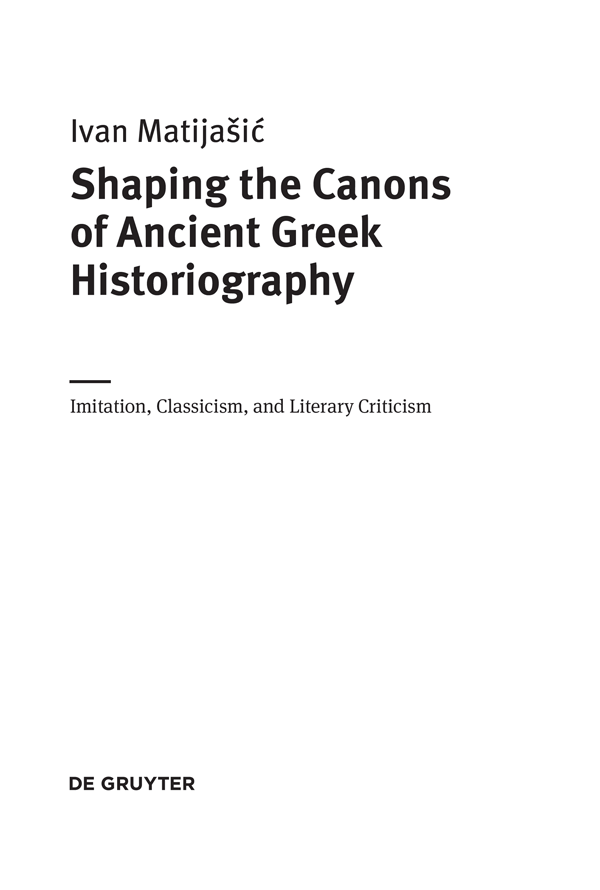
ISBN 978-3-11-047512-8
e-ISBN (PDF) 978-3-11-047627-9
e-ISBN (EPUB) 978-3-11-047543-2
ISSN 1616-0452
Library of Congress Cataloging-in-Publication Data
Names: Matijai, Ivan, author.
Title: Shaping the canons of ancient Greek historiography : imitation, classicism, and literary criticism / Ivan Matijai.
Other titles: Beitrge zur Altertumskunde ; Bd. 359.
Description: Berlin ; Boston : Walter de Gruyter GmbH, 2018. | Series: Beitrge zur Altertumskunde ; Band 359 | Includes bibliographical references.
Identifiers: LCCN 2018014907| ISBN 9783110475128 (print) | ISBN 9783110475432 (e-book (epub) | ISBN 9783110476279 (e-book (pdf)
Subjects: LCSH: Greece--Historiography. | Historians--Greece.
Classification: LCC DF211 .M38 2018 | DDC 938.0072--dc23
LC record available at https://lccn.loc.gov/2018014907
Bibliografische Information der Deutschen Nationalbibliothek
Die Deutsche Nationalbibliothek verzeichnet diese Publikation in
der Deutschen Nationalbibliografie; detaillierte bibliografische Daten sind im Internet ber http://dnb.dnb.de abrufbar.
2018 Walter de Gruyter GmbH, Berlin/Boston
www.degruyter.com
A nono Mano (19282013)
Acknowledgements
This book stems from a PhD thesis written in Italian and defended at the Scuola Normale Superiore di Pisa in July 2015. Carmine Ampolo, Luigi Battezzato, Didier Marcotte, Astrid Mller, Leone Porciani, Maria Serena Funghi, and Anna Santoni were the members of the committee that awarded my PhD: my gratitude is due to them all for the invaluable insights and suggestions that emerged during and after the discussion.
My supervisor, Carmine Ampolo, kindly and steadily encouraged my research during my years in Pisa, where I also enjoyed the friendly and helpful support of Anna Magnetto and Donatella Erdas. During my PhD, I spent the academic year 20122013 at the Albert-Ludwigs-Universitt Freiburg im Breisgau, where I benefitted from Astrid Mllers hospitality and Hans-Joachim Gehrkes renowned humanitas: I wish to thank them both for their help and encouragement during those two semesters in the Schwarzwald. I also benefitted greatly from the seminars they organised (International Network Historiai ), which were held both in Freiburg and Munich. I am likewise grateful to Didier Marcotte (Paris, formerly Reims) who gave me the opportunity to participate in research seminars in Reims and Madrid, where I also presented some of the results of my research on the canons of Greek historiography. Finally, I was invited to present some of the chapters of this book in Perugia: I warmly thank Francesco Prontera for the invitation and hospitality.
The publication of a book is rarely a solitary and isolated effort and I am fortunate enough to have many friends and colleagues who read and commented on the book (or portions of the book) and helped at different stages of the work.
Aude Cohen-Skalli (Aix/Marseille) and Carlo Franco (Venice) read the whole manuscript and offered extremely useful suggestions on both single points and general dispositio: I do not think I will be able to repay this debt, and the least I can do is to use these lines to thank them warmly.
The philological acumen of Filippomaria Pontani (Venice) has always represented a valuable benchmark for my own work: this book is no exception. Many of the topics that appear in the following pages were discussed in a low voice in the library of the Scuola Normale in Pisa: there I often met Leone Porciani (Pavia), whose insightful observations guided me through some debated ancient passages. Aldo Corcella (Potenza) kindly read my PhD thesis and offered his valuable advice. I had the opportunity to discuss my work with Roberto Nicolai (Rome), Fausto Montana (Pavia), and Irene Pajn Leyra (Seville) whose remarks were extremely helpful. Franco Montanari (Genoa), Pietro Liuzzo (Hamburg), Claudio Biagetti (Rome), and Vera Grossi (Verona) generosly shared their published and unpublished work. I take the time here publicly to thank all of these.
In Venice, I have the privilege to number among my friends Stefania De Vido, Luca Mondin, Olga Tribulato, and Francesco Valerio. They have all encouraged me throughout these years and offered their unconditional support.
The book itself was conceived and written between Italy, Germany, and the UK. I had the opportunity to work as Postdoctoral Fellow first in Venice, under the supervision of Claudia Antonetti and Giovanella Cresci Marrone, then in Mnster with Peter Funke, and in Berlin with Klaus Geus: to all of them I send my warmest gratitude. I also wish to thank the Gerda Henkel Foundation and the Center for International Cooperation of the Freie Universitt Berlin for supporting my research. The School of History, Classics and Archaeology of the Newcastle University generously funded the publication of this book. Federico Santangelo (Newcastle), who was extremely supportive during a short but difficult period, enthusiastically read the whole book in one of its latest versions: his comments were extremely valuable and I wish to express to him my deepest gratitude.
My parents Klara and Robert, and my whole family, have never failed to encourage me in every possible way, expressing their love through pantagruelian meals and excellent wines. My wife Irene, with whom I share many common interests, except, fortunately, Classical Studies, has always been my strongest supporter. When I told her I was going to re-write my thesis in English for publication, she exclaimed: Why do you always have to choose the hardest way? Despite her reservations, my hope is that native speakers will not get too annoyed with any error or infelicities of language that might still linger here and there, for which I am solely responsible.
This book is dedicated to the memory of my grandfather Herman Buri, who taught me the essence of history and the pleasure of hard work.
Abbreviations and Translations
Abbreviations for ancient authors and works mostly follow those of the Oxford Classical Dictionary (fourth edition, 2012). However, see 3.1 for the slightly different abbreviations adopted for Dionysius of Halicarnassus rhetorical treatises. For journals, I have followed the abbreviations of LAnne philologique , while for inscriptions those of the Supplementum Epigraphicum Graecum. For each papyrus mentioned throughout the book, I have included the references to the CEDOPAL number (Mertens-Pack3) in the index.
Throughout this book I have used the following English translations of Greek and Latin texts, sometimes slightly modified: May/Wisse (2001) for Ciceros On the Orator ; Hendrickson/Hubbel (1939) for Ciceros Brutus and Orator ; Russell (2002) for Quintilians Institutes of Oratory ; Usher (19741985) for Dionysius of Halicarnassus critical essays. There are also other instances where I have relied on published translations: these are duly reported in the text. Unless otherwise noted, all remaining translations of Greek and Latin texts are my own. For modern languages, I have used English translations where suitable, but, where nothing else is reported, translations are also my own.

